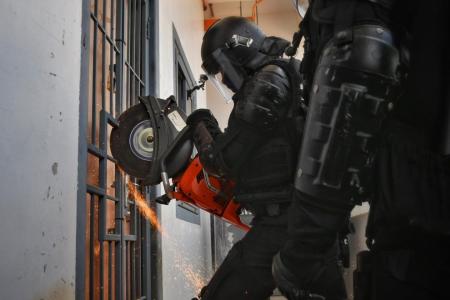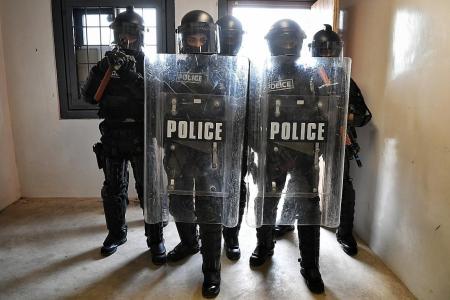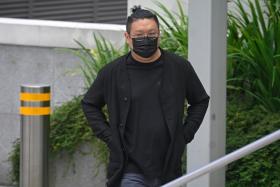Police share how stand-off situations are handled
Police demonstrate how situations are handled and the psychological nous required in negotiation tactics
A woman calls the police for help after her distraught husband locks himself in their flat, having incurred gambling debts.
The situation becomes chaotic as the police attempt to negotiate with the increasingly agitated man who threatens to kill himself. The ordeal ends when the police gain access to the flat and restrain him.
The police re-enacted this scenario to the media at the Home Team Tactical Centre on Tuesday, to explain what a stand-off situation - when a person, evading police arrest or attempting suicide, locks himself in a unit - looks like.
"A stand-off situation can be highly dynamic," said Assistant Commissioner of Police Gregory Tan Siew Hin, commander of Central Police Division.
"In some incidents, the individual... turned violent and threatened the safety of others within the unit and that of responding police officers."
He said the priority is to resolve the situation safely and ensure those involved receive medical attention if needed.
Responding first to such situations are Ground Response Force officers such as Station Inspector Shahreel Samsudin.
He said: "We assess the situation, get the layout of the place and gather as much information as we can. From there, we determine the next step.
"If the door is locked but the person is talking to us, we will try to get them to open the door."
But stand-off situations, which can last for more than 12 hours, are often complicated.
The police have adapted their protocol in recent years to ensure options are available on site and on short notice to handle negotiations and force entry if the need arises, AC Tan said, explaining why the public often sees several police officers responding to such situations.
These include officers from the Crisis Negotiation Unit (CNU) and Special Operations Command.
AC Tan said the ideal outcome is for the other party to surrender without the use of force.
"Many incidents have been resolved without any force due to persistent and effective engagement," he added.
Officers and psychologists from the CNU who are trained in negotiation tactics also play an integral role.
Principal psychologist at the CNU, Ms Ho Hui Fen, said: "For negotiators, an important skill is the ability to communicate effectively and to show empathy.
Active listening skills are the tools of the trade.
Also, a core requisite of every negotiator is that he or she cares about the person they are dealing with."
She said a challenge negotiators face is establishing rapport with a person who may not want to talk, is intoxicated or having mental health issues.
Ms Ho once had to negotiate with a naked man seated on a balcony, drunk and suicidal.
Due to the building's layout, a tactical option was not possible and negotiation was the only way to get the man to safety.
"Luckily, he eventually came down from the balcony safe and sound," she said.
Get The New Paper on your phone with the free TNP app. Download from the Apple App Store or Google Play Store now



